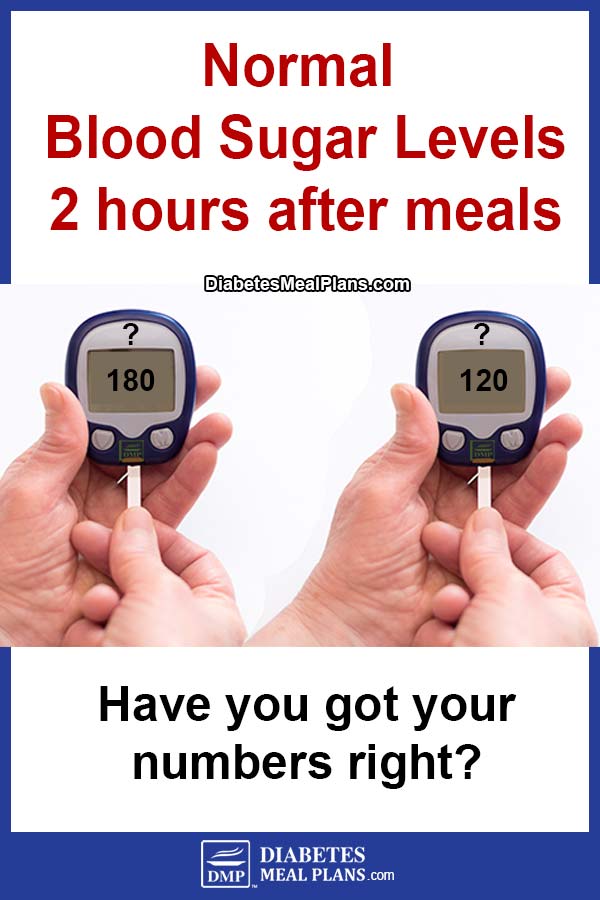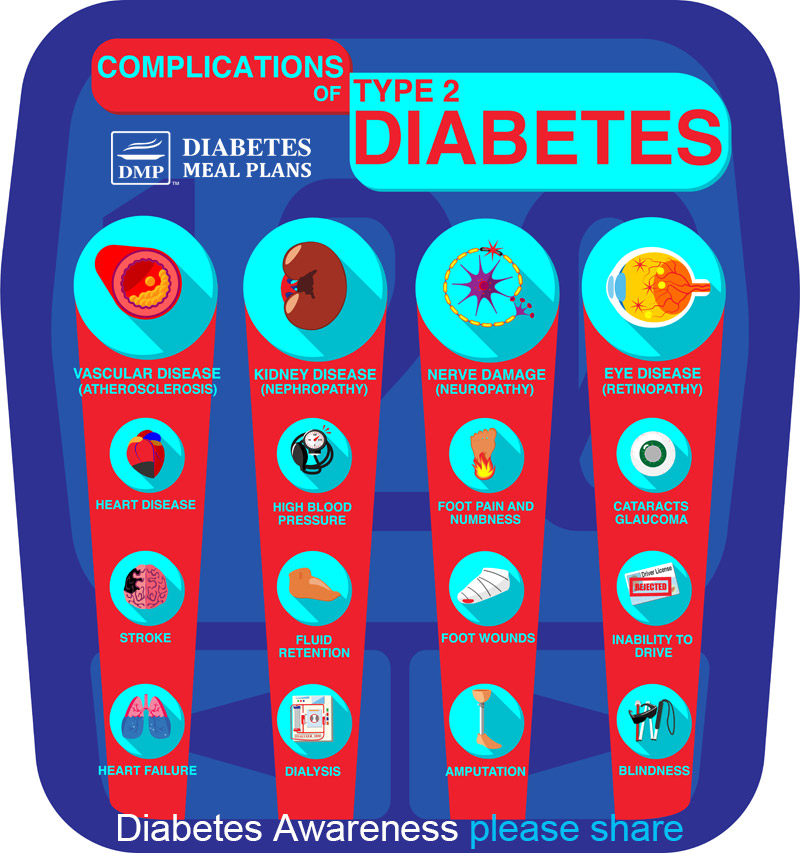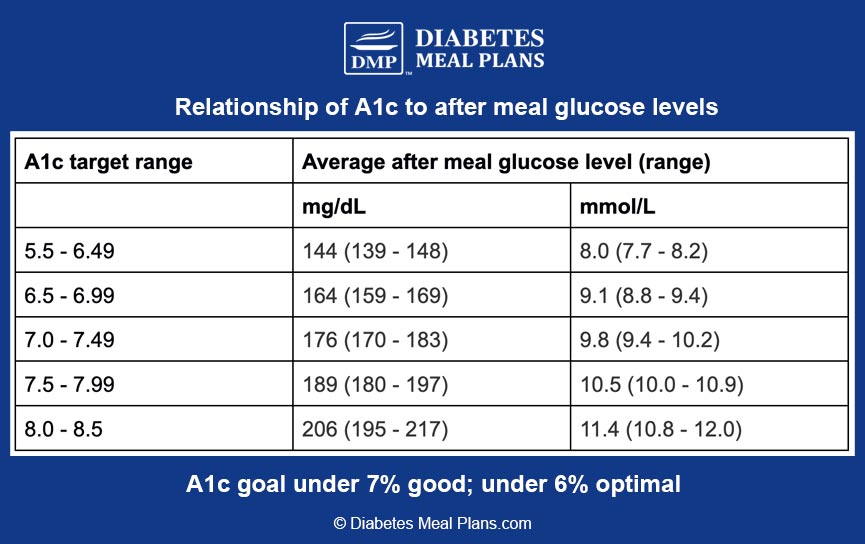Knowing what a normal blood sugar level is 2 hours after eating is important for monitoring your type 2 diabetes or prediabetes health, and to achieve lower A1c results.
Importantly, the question is: are you monitoring your levels using the right numbers?
Let’s explore that now.
General recommended goals for type 2 diabetes are too high
According to organizations such as the American Diabetes Association and other diabetes organizations across the globe, a blood sugar of 180 mg/dL or 10.0 mmol/L is an appropriate goal 2 hours after eating.
You might have heard your doctor recommend this as well, since this is a common goal level referred to in most medical care guidelines.
If you’re aiming for 180/10.0, this is certainly a good start, especially if you’ve had high blood sugar levels at 250+. But in the long term, this general recommended goal is too high.
Ideally, you want to aim to get your blood sugar lower after meals – and there’s an important reason why.
What is normal blood sugar after meals?
Normal blood sugar 2 hours after meals for non diabetics is under 140 mg/dL or 7.8 mmol/L.
This is considered “normal” and therefore, a maximum of 140 mg/dL or 7.8 mmol/L is the ideal blood sugar after meals for people with type 2 diabetes or prediabetes as well.
Both the American Association of Clinical Endocrinology and the International Diabetes Federation agree that working toward a maximum of 140 or 7.8 is ideal, if you can achieve it.
So let’s consider why this is so important…

Why “normal” blood sugar range is important
The body is designed to maintain blood sugar levels in a healthy “normal” range.
It is best for people with type 2 diabetes and prediabetes to work toward the goal of having normal blood sugar levels because high blood glucose levels causes damage to cells and vessels throughout the body, which can lead to nasty diabetes complications.
Reduced risk of complications is something very important to consider, because the complications of diabetes can be awful, even life threatening. So, everything you can do to avoid them is important!

The good news is, achieving an average blood sugar that is normal – a maximum of 140 mg/dL or 7.8 mmol/L 2 hours after meals, can help significantly reduce risk of diabetes complications.
Reduce blood sugar, reduce A1c
Your doctor may harp on to lower your A1c levels, and that’s important. So here’s the thing: your average blood sugar level over time will reflect in your A1c test result.
That’s because A1c measures the amount of glucose/sugar in your blood from approximately the last 3 months.
If you reduce your average blood sugar from 180 mg/dL or 10.0 mmol/L after meals, down to 140 mg/dL or 7.8 mmol/L 2-hours after meals, look what happens to A1c.

With a goal of 140 mg/dL or 7.8 mmol/L 2-hours after meals, A1c estimations are around 5.5 to 6.5%; while at 180 mg/dL or 10.0 mmol/L after meals, your A1c will be more than 1% higher, at around 7.5 to 7.9%.
The point is, if you reduce your blood sugar, you reduce your A1c. The best way to do this is by following a nutrient dense lower carb eating plan, such as what we recommend here at DMP.
David G, VIP Member
“My A1c went from 12.4 to 5.2 in 4 months and fasting blood sugars now run 90’s to low 100’s. Thanks for everything.”
RECAP:
Normal blood sugar 2 hours after eating is a maximum of 140 mg/dL or 7.8 mmol/L, so this is your goal to work toward over time because maintaining blood sugar levels in the “normal” healthy range keeps you healthier overall, and drastically reduces your risk of diabetes complications!
Need help to achieve normal blood sugar levels? Join Us As a Member Today.
In as little as 16 weeks, you’ll see your numbers change dramatically and you can reduce medication (87% of members do).
Plus, you will end your confusion forever as we’ll show you exactly how to maintain optimal diabetes health long term.



John J SILLIKER
Thank you, this is the first time I could understand the numbers.I always thought any number over 140 was bad 2 hours after a meal. I usually check my level in the evening.
Dr Jedha
Great to hear you found the info helpful John – under 140 is certainly the goal after meals!
Rick Baker
80 year old male just 8 weeks ago I was give a diagnosis type II diabetes. My A1c is now 6.5, it was 7.8. So I think I’m doing better. Eating good food is a challenge!
Dr Jedha
Sounds like you’re doing great so far Rick – well done! It can take time to get the ‘good food’ thing feeling natural, so just keep at it. Make sure you grab a free copy of our food list to help you get the best results.
Don McCall
I have type 2 Diabetes and have a question. I have had diabetes for 19 years and we were told that I needed to have a snack after 2 or so hours a meal. Is this correct. My A1C runs from 6.8 to 7.2. Also what is amount of Carbs for meals?
Emily - Dietitian (MS, RD)
Hi Don – do you have a glucometer and are you checking your blood sugar at home? You would only need a snack if you found your blood sugar was dropping between meals, which can be common for some diabetics but certainly not all. Otherwise, snacks are a choice if they fit into your lifestyle and depending on the timing of your meals. A good goal is to eat about every 3-4 hours at minimum. If you don’t have a glucometer, it probably is a good idea to purchase one as that is the most effective way to see how your dietary changes are impacting your sugar level. We recommend somewhere around 80g carbs per day, so you’d want to keep your meals in the 20g carb range, and that leaves you still some carbs for a snack as desired.
Sue Peel
Hi. I am a 67 year old woman. I have been pre1diabetic for many years. My A1C ranges between 6-1 to 6-3. I recently started 500mg of metformin since my last test was 6.8. After 3 months I got it back down to 6.5. My post meal is still high at times and wondering if 6.5 is an acceptable range or should I increase the metformin. My doctor is happy with the improvement so far.
Dr Jedha - Nutritionist (PhD)
Hi Sue, if you have prediabetes with a 6.5 you are on the verge of a type 2 diabetes diagnosis. The thing is, you are asking the wrong question. You said your post meal levels are still high – then that’s what you should be working on as this will lower your A1c. It’s best to avoid increasing medications and being PREdiabetes, you can avoid a diabetes diagnosis too. The goal is to aim for an A1c under 6% and with some diet and nutrition changes you should easily be able to do that. If you need help and support, consider joining our Prediabetes Program.
Ginny
Hello, my A1c is 5.8 and my holistic practitioner would like it to be at 5.4. My total serum cholesterol is at 190, so I don’t eat a lot of dairy, meat or seafood. It had previously been at 267 and I was able to lower it with diet, timed restricted eating and increased exercise. I’m interested in your meal plan program, but it seems like a lot of the foods contain dairy and meat. I take psyllium husk daily and eat a very high fiber/very low sugar (dates and maple syrup when needed) and lower carb diet. My morning fasting blood sugar is sometimes 99 and sometimes 125. It rarely goes above the 135 mark at any other time (one hour or two hour post meal). Do you have any other recommendations? What is the potential cause of the rising blood sugar in the morning? I do qigong daily, I walk 3 miles per day at a very fast pace and I workout with weights for 2 hours three times per week. I would actually like to gain some weight.
Emily - Dietitian (MS, RD)
Sounds like you are doing a lot of the right things with the lower carb diet and exercise! More emerging research suggests dairy, meat and seafood are actually great additions to a heart healthy diet, plus they are all low carb foods that might help drop your A1c to where your practitioner would like it. Read a bit more about morning blood sugar levels here.
Ray
Hi, I have been a type2 since 2015, recently I have a 50 lbs weight loss, my glucose morning readings 92-118 MG. 2 hours after eating was yesterday 134 MG. Today 2 hours after eating is 82 MG. Is that normal? I have cut most carbs out my meals. I have platue in my weight. I would like to lose 15 lbs more. Any suggestions? Would appreciate it . Thanks Ray
Dr Jedha - Nutritionist (PhD)
Congrats on the weight loss and improvements Ray! It’s normal for levels to fluctuate and your levels are within normal ranges 70-140 after meals. For a weight loss plateau, try keeping a food diary to identify any issues or mix things up by including a wider variety of nutrient-dense foods in your diet so it’s not the same day in and out. Other things also influence – stress, sleep, activity, hydration etc. But, also acknowledge that you are doing really well too – good luck!
Elliot
Thank you, yet again. I’m always learning from you. I had set my glucose monitor target range to160, but just I just reset it to 140. You’re information is always so helpful.
I generally test 2 hr after meal, but read somewhere it should be 2 hr after first bite. Any thoughts?
Also just learned of a product called carbquick made from fiber of wheat (made by company that makes bisquick). Have you heard of it? Is carbquick any good?
As always, thank you,
Elliot
Dr Jedha - Nutritionist (PhD)
Great to hear you find the info helpful Elliot! Yes, that’s right, timing 2 hours from your first bite of food is best. We’ll make sure to make this clear in the info above. Carbquick is made from Carbalose flour, which is designed to act similarly to wheat flour so people can do baking etc. It is made from wheat components such as high protein wheat flour, wheat fiber, wheat protein, vital wheat gluten, wheat starch and other fibers like oat and soybean – that’s how they get the carb content down. This product is overall pretty good. Haven’t tried it but we might add it to our list. Let us know what you think if you try it.
Elliot
Thank you. If I try it I will update you…
Deborah
My last A1C was 4.8. I’m on no medication, just control through diet. I was wondering if 4.8 was too low.
Emily - Dietitian (MS, RD)
An A1c of 4.8% is not necessarily too low, unless you are frequently experiencing signs or symptoms of hypoglycemia (low blood sugar.) An A1c of 4.8% is equal to an average blood sugar of 93mg/dl or 5.2Mmol/L – which is excellent. If you do have concerns about possibly hypoglycemia, your doctor can better review your symptoms to make a determination.
Deborah
. I have no symptoms of hypoglycemia. Thank you for you excellent service, I can truly say this site has been instrumental in helping me control my diabetes.
Dr Jedha - Nutritionist (PhD)
That’s great Deborah! Being on no medication, a 4.8 is in the normal blood glucose range (4.0-6.0), which means you have very low risk of diabetes complications and other issues. Glad to hear our information has helped you achieve better health. 😁
Grisel Nieves
I wang to know how the system works and how much for each meals. Please send md the information by email, please thanks.
Dr Jedha - Nutritionist (PhD)
Hi Grisel, you can learn about our membership subscriptions here: https://diabetesmealplans.com/diabetic-diet-meal-plans/
If you have other questions email our support team at [email protected], they will be more than happy to help.